Operatoonity.com review: Turandot presented by Opera Philadelphia
Live performance: Sunday, October 2, 2016, 2:30 p.m.
The Academy of Music, Philadelphia, PA
Music: Giacomo Puccini
Libretto: Giuseppe Adami and Renato Simoni
5.0 out of 5.0 stars

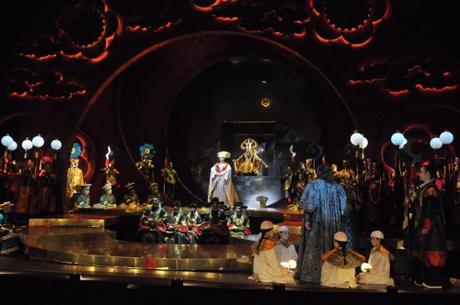
Princess Turandot (soprano Christine Goerke) has vowed never to marry unless a man of noble birth can solve her three riddles. | Photo by Kelly and Massa for Opera Philadelphia
Some say Turandot, Puccini’s final opera, unfinished when he died, is his tour de force. Puccini lovers including a number of Operatoonity.com readers cite its adventurous musical qualities. Lush orchestration with exotic Asian elements, both instrumental and compositional. Not to mention opera’s most famous tenor aria “Nessun Dorma.”
Puccini’s magnum opus will surely prove to be Opera Philadelphia’s tour de force this season. Their Turandot was nothing short of fearless and peerless spectacle, boldly embracing both the mystery and vibrancy of Asian culture on every level–sight, sound, movement, concept, staging, lighting, costume. It was the most mystical, moving mainstage production I’ve witnessed in five years.
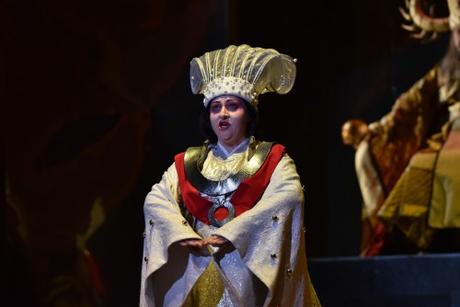
Princess Turandot (soprano Christine Goerke) has vowed never to marry unless a man of noble birth can solve her three riddles. | Photos by Kelly and Massa for Opera Philadelphia
Not because of the title character, sung in this production by dramatic soprano Christine Georke. The storyline builds up Turandot’s first entrance so unrelentingly and thoroughly that the audience’s anticipation of their first glimpse and hearing of the icy princess is palpable. Perhaps only ghosts of the late great Sutherland and Tebaldi could satisfy this pent-up expectation for an imperiously icy Turandot who sings in unforgettable form.
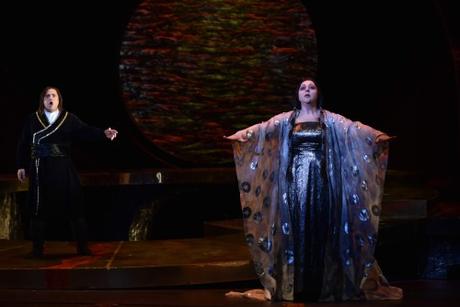
Princess Turandot (soprano Christine Goerke) addresses Calaf, who has announced he will attempt to solve her deadly riddles. | photos by Kelly and Massa for Opera Philadelphia
Goerke sung a serviceable Turandot but not a great one. She was stronger in her third act duets with Prince Calaf than in the second, when she first appears. She screeched a few high notes in “In questa reggia,” the aria during which she explains that the obscure riddles are intended to avenge her ancestress, killed when an evil warlord conquered her kingdom. Granted, this may be the most difficult soprano role Puccini ever wrote, requiring the talents of a legendary soprano like Birgit Nilsson. However, Georke sang the role at the Met last season. If she is considered one of the best of her contemporaries, that is not the Georke I heard that afternoon.
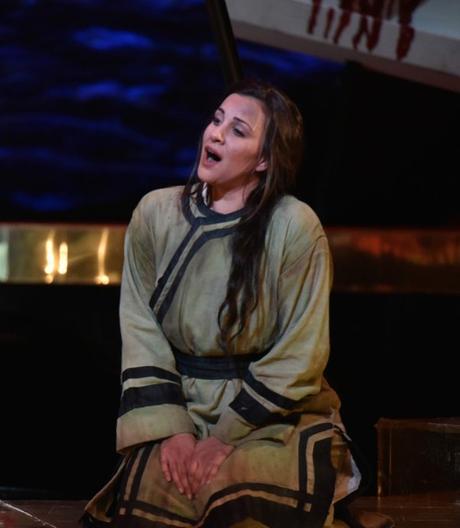
Liù (soprano Joyce El-Khoury) explains how she has stuck by her master, Timur, because his son, Calaf, once smiled at her.
By contrast, from the first note of her first aria, soprano Joyce El-Khoury sang a meltingly lovely Liù that compelled listeners to lean in to capture every note. The show may be entitled Turandot, but in this production, El-Khoury’s Liù captured the devotion of the audience and the heart of this critic.
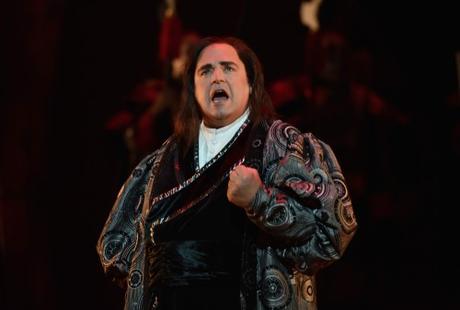
Calaf (tenor Marco Berti) declares he will put his life on the line to win Princess Turandot’s heart. Photos by Kelly and Massa for Opera Philadelphia
As The Prince with No Name, tenor Marco Berti, faces a daunting professional challenge because “Nessun Dorma” is all but attached to the ubiquitous Pavarotti version. Berti’s take was beautiful and powerful and the audience lauded him for his effort. His overall performance was sturdy, if a little wooden, especially when Liù pours out her secret love for him. Based on his performance, the supertitle of his reaction to her heartfelt, heartbreaking confession should have been, “Meh.”
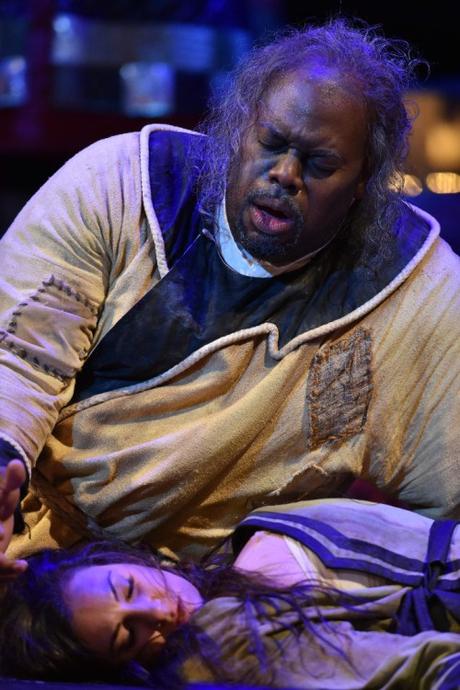
The exiled king Timur (bass Morris Robinson) discovers his slave girl, Liù, has sacrified herself for love. | photos by Kelly and Massa for Opera Philadelphia
Bass Morris Robinson’s performance as King Timur was pitch perfect in every way. His voice was in excellent form and his sympathetic characterization of an exiled, broken ruler authentically and deeply felt.
While the opera company did not furnish a production photo of Ping, Pong, and Pang to share with Operatoonity.com readers much to my chagrin, this reviewer would be remiss not to fete them as a highlight of this production. Daniel Belcher as Ping, Joseph Gaines as Pong, and Julius Ahn as Pang were frighteningly entertained at times barbaric and in one shining number sympathetic, while remembering happy lives in their peaceful hometowns before being summoned into service for the Princess of Death. Perhaps Opera Phila didn’t want to fuel complaints of ethnic stereotyping by providing pictorial evidence of these portrayals. Just like the fictional kingdom in which they serve, these characters were a brilliant mash-up of more world cultures than a Kia Soul commercial and no genuine cause for concern.
The entire opera chorus from the littlest priests to all the grown-ups living under Turandot’s tyranny (the show’s Greek chorus) to the lithest dancer deserves kudos. So does conductor Corrado Rovaris and his versatile opera orchestra, whether playing gongs, indigenous instruments, or Western ones merely tuned to sound like they are native to the Far East.
Riddle me this, Operatoonity.com. If the performances weren’t five stars with each turn (except for El-Koury and Robinson), why the five-star rating? The direction, the orchestra, the spectacle, the high concept were out of this world. Director and Choreographer Renaud Doucet staged an arresting, layered production that must be experienced. The stunning lighting, staging, and choreography of this show have already premiered at companies with whom Opera Philadelphia is co-producing this show including Minnesota Opera, Cincinnati Opera, Pittsburgh Opera, Utah Opera, and Seattle Opera, but (with any luck) not all.
A singularly original and richly satisfying opera. That’s what Opera Phila brought to the City of Brotherly Love. Turandot was a triumph. Turandot is Opera Philadelphia.

